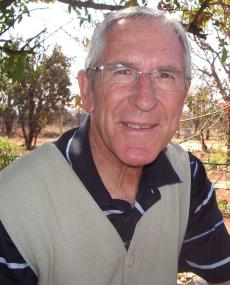
Kevin Patrick Dowling was born in Pretoria and was ordained as a priest of the Congregation of the Most Holy Redeemer on 9 July 1967. He was appointed the Bishop of Rustenburg on December 2 1990, and Archbishop Denis Hurley conferred his Episcopal consecration on January 27 1991.
Bishop Dowling has ministered in various parts of South Africa, in townships in Cape Town and Pretoria.
In Rustenburg, Bishop Dowling was based at the St Joseph’s Mission, strategically placed at a site on the border of South Africa proper and the homeland of Bophuthatswana, within which the Bafokeng territory of Phokeng fell.
The St Joseph’s Mission, under Bishop Dowling, became a refuge, meeting point and site of struggle in the late 1980s and early 1990s. Testifying at the Truth and Reconciliation Commission in 1997, Bishop Dowling recounted how he was summoned by the President of Bophuthatswana on 12 February 1991.
Appearing before Mangope and several cabinet ministers and security force personnel, he was asked to explain why he was allowing church property to be used by anti-apartheid activists. He explained that he believed in democracy and freedom of speech, but his interrogators took this stance as support for forces bent on destabilising the homeland.
In March 1991, after the entire executive of the recently unbanned ANC had been arrested, Bishop Dowling took action to determine where they were being held, and his intervention resulted in the release of various activists, including Maggie Bopalamo.
When Bafokeng Queen Semane Molotlegi became the target of security force scrutiny and harassment, and was under threat of being removed from her house in Phokeng and deported, Bishop Dowling made representations to halt the move, which he argued would destabilise the area as she commanded significant support.
In April 1992 he was again summoned to see Mangope, and accused of giving the National Union of Mineworkers (NUM) a platform and meeting place, especially as mineworkers had embarked on frequent strikes and political action.
He cited the example of Mrs. Maggie Bopalamo, who had suffered much under the draconian laws of Bop as well as South Africa to make the point that democratic and political freedoms had been curtailed.
After the democratic election of 1994, Bishop Dowling shocked the Catholic world when he registered his disagreement with the Vatican’s strictures against the use of condoms. Reasoning that in a country ravaged by HIV/Aids, the condom was at the forefront of the struggle against the epidemic, he interpreted the papal position to mean that when lives are at risk, orthodox measures can and must be reviewed.
Bishop Dowling has also gone against the grain of the Southern African Catholic Bishop’s Conference’s decision to apply to revise the English translation of the Mass liturgy. He is convinced that the decision is part of a “systematic dismantling ”¦ of the vision, theology and ecclesiology of Vatican II”